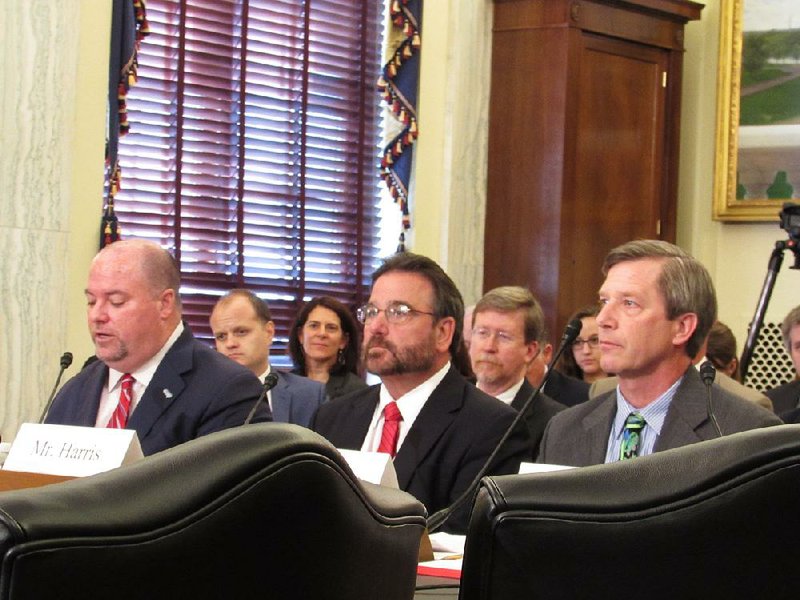WASHINGTON -- Farmers and ranchers would see a boost if the U.S. embargo on trade and travel to Cuba were completely lifted, Riceland Foods Inc. Vice President Terry Harris told a U.S. Senate panel Tuesday.
Harris testified on behalf of the Stuttgart-based rice company before the Senate Agriculture, Nutrition and Forestry Committee along with representatives from other agricultural industries and from the U.S. Agriculture, Commerce and Treasury departments.
Late last year, President Barack Obama announced that the United States will ease travel and banking restrictions and will restore full diplomatic relations with the communist country, including opening an embassy in Havana for the first time in more than 50 years.
The president's new policy made travel to Cuba easier for family visits, government business and professional research, as well as for educational, religious or humanitarian trips. Federal law still prohibits any other travel to the country, including tourism, and restricts trade and financing.
Only Congress can lift the current embargo, a move some members, including House Republican leaders and some Cuban-American senators, oppose.
Harris said the Obama administration's tweaks to regulations haven't done enough to persuade Cuba to resume buying U.S. rice. All Cuban agricultural imports from the United States are controlled by a state-owned entity, Alimport, that purchases products for the majority of Cubans.
"The day after the president's announcement I contacted Alimport and told them certainly we have an interest in doing business there. They thanked me very much for the call, but had no interest in purchasing U.S. rice," Harris said. "I really think they are looking for an elimination of the embargo. The small incremental moves that we are making are not swaying them."
Doug Keesling, a wheat farmer from Chase, Kan., also testifying before the committee, agreed that the embargo is limiting wheat exports, saying it is easier for Cuba to purchase wheat from Canada or France than to jump through the hoops to buy it from the United States. He said his crop will be ready for harvest by July 4.
"If the embargo was lifted, we could be selling wheat to Cuba in July or sooner," Keesling said. "This is what's holding it up."
Texas A&M University Agriculture Economics professor C. Parr Rosson told the committee that the executive branch's moves have resonated more in the U.S than in Cuba.
"In our perception this is a very strong signal. In their minds it may not be strong enough," he said. "I believe they are still waiting to see what we're going to do."
Cuba hasn't purchased U.S. rice since 2008, Harris said.
Before the U.S. embargoed trade to Cuba more than 50 years ago, the island was the No. 1 export destination for U.S. rice, Harris said. Now Vietnam provides rice to the nation less than 100 miles from the Florida keys.
Harris estimated that if the embargo and accompanying restrictions were lifted, the U.S. could regain up to 30 percent of the Cuban rice business within two years -- as much as 133,000 tons of rice. Within 10 years, rice farmers could be providing 75 percent of Cuba's rice, he said.
Rosson said the only current agricultural exports from the U.S. to Cuba are poultry, corn and soybeans. He estimated that the United States could be exporting $1 billion worth of goods there if the embargo were removed.
U.S. Agriculture Department Undersecretary for Farm and Foreign Agricultural Services Michael Scuse said the United States should be dominating the corn, wheat, rice and dairy markets in Cuba, but cannot because of limitations under the embargo, such as a prohibition on extending credit or marketing American-made products.
Scuse told the committee he's not aware of any other country that has to go through the same hoops to sell products in Cuba as the United States does. He said Cuba imports 80 percent of the food it needs to feed its 11 million people.
"The playing field is not level and it creates a great deal of difficulty for us to compete against those countries" he said. "Fifty percent of the rice is coming from Vietnam. We should be the one supplying rice to Cuba... When these current restrictions are gone I think there are a lot of opportunities."
U.S. Sen. John Boozman, a Republican from Rogers, said after the hearing that efforts to lift the embargo are gaining momentum. In January, Boozman joined a group of senators in sponsoring a bill that would let Americans freely travel to Cuba. It has not been considered by the Senate Foreign Relations Committee. Other congressmen have proposed legislation to lift the embargo all together.
"We've been doing the same thing decade after decade. It hasn't worked, it's time for a change. The good news is I think that Congress is actually starting to realize it," Boozman said. "We trade with a lot worse people as far as human rights and every other aspect; the Chinese, the Vietnamese, the Venezuelans, the Saudis. I think we have to be consistent. If we could trade our ideas, our culture along with products, then that would change Cuba more than anything else."
Business on 04/22/2015
